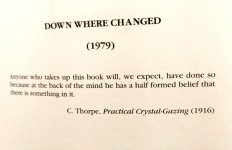Benny Bunter
Well-known member
In that respect, Prynne has been very wise in almost never doing interviews or explaining his poems.
the nutter i met and he claimed prynne was like hmm yes, but have you thought of this?I'd imagine he'd be very pleased with things like this Kevin Nolan essay, or that nutter on Tumblr or substack or whatever it is.
He talks about it in the introduction to this rare reading.Just like he hardly ever does readings, cos he's against the idea of putting obstacles in the way of a reader inventing his own interpretation of the poem. If people hear the poet himself performing his own stuff, they can never unhear it, and that supposedly 'authentic' voice in their memory colours their reading of the text forevermore. Prynne hates the idea of that.
You met the nutter? What was he like?the nutter i met and he claimed prynne was like hmm yes, but have you thought of this?
Just read this again seeing as I've been getting back into Prynne again after a long time off - probably the best overview of his work there is.

Robert Potts · Smirk Host Panegyric: J.H. Prynne
www.lrb.co.uk
The epigraphs to his books are brilliant and often you're left wondering whether they have anything to do with what follows, or if they're just there to fuck with you. It's impossible to tell.Out of context, his epigraphs can seem like sly jokes and maybe some are... ‘The volatility smile is not symmetrical’ (the epigraph to Red D Gypsum from 1998), which sounds like straightforward Surrealism, is from a hedge-fund expert...I like the way he does this sort of thing. Reminds me of a Rene Hell album I like called Vanilla Call Option where, iirc, he said he came across the phrase reading about the stock market and it just had something about it. I was reading something earlier which used the phrase 'viral economy' and it's still going round in my head.
not nutty. he came to my book lainchYou met the nutter? What was he like?
The epigraphs to his books are brilliant and often you're left wondering whether they have anything to do with what follows, or if they're just there to fuck with you. It's impossible to tell.
There's that one about reading something because you feel there must be something there... A similar sentiment came up in an LRB piece I read recently,
Dissemination and hermeneutics need not be contrasted so extremely. They are more plausibly seen not as irreconcilable theories of meaning, but as practical interpretive strategies, as facets of any good reading. So regarded, disseminative practice ensures that the text’s complexity is not underestimated, while the hermeneutical sense-making activity keeps the dissemination from wandering off infinitely. The search for sense in the text will not bring the reading to a premature halt, for complexity and sense are rarely in equipoise. The reflective equilibrium aimed at in one reading is likely to become unbalanced in the next, and re-established only by other means. What would stop the will to read, especially in the case of philosophy, is the discovery of the text’s final undecidability or unintelligibility. If I understand Hartman correctly, he is right to think that reading will continue only so long as it trusts that the failure to make sense is its own and not the text’s.

not nutty. he came to my book lainch
I guess I don't have a problem with any individual poet doing this, not reading their poems, that is, treating poetry primarily as a textual rather than oral traditionJust like he hardly ever does readings, cos he's against the idea of putting obstacles in the way of a reader inventing his own interpretation of the poem. If people hear the poet himself performing his own stuff, they can never unhear it, and that supposedly 'authentic' voice in their memory colours their reading of the text forevermore. Prynne hates the idea of that.
